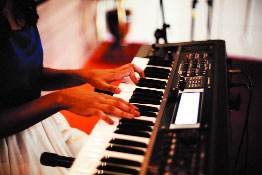Music can be used as a powerful tool to introduce the concept of empathy in children at a young age.
Have you ever wondered what it means to be empathetic? To put yourself in another’s shoes and actually feel what they are they are going through? Empathising with people allows us to build relationships which are based on understanding and acceptance. Loneliness is the biggest vice in today’s society and it can be managed with empathy. We need to invest in people around us, link ourselves with others and develop an interface with them.
Most importantly, we need to inculcate the concept of empathy in children. To enable the development of a child’s emotional quotient and help them grow into dignified and civil adults, empathy needs to be introduced to them when they are impressionable and open to learning.
One of the mediums to facilitate this could be music.
Helps express themselves
It allows children to express their angst and negativity in a constructive manner providing them with an outlet through which they can present their real-self. Music creates a space for them where they feel safe and are able to actually comprehend their feelings, able to make sense of their emotions and gauge their responses to different situations.
Maintains peace and harmony
The reverberation of notes allows children to connect on a plane of consciousness that is far removed from the reality they are facing. The fluidity of music allows them to immerse themselves in the beat, the rhythm, the tonality and the tempo. It allows them to work in harmony with each other while playing and performing. This enables them to become one identity and a part of something that is bigger than them. It encourages children to connect with one another on an abstract level, allows them to gain insight and perspective into lives of people who are performing with them.
Inculcates leadership skills
Music therapy and composition allows children to learn, play and compose basic musical concepts. The idea is designed to create a broad ambit of empathy builders in the community, enable children to make and co-create music collectively, engage the community in activities related to empathy and inculcate skills of leadership in children. It allows for the creation of peer educators who can further the concept of music therapy, harmony and learning.
Enhances confidence
Through musical therapy various activities are designed and pursued, focussed on learning and creating music in a collective manner. These include writing empathy songs with a friend, making musical instruments and performing for the community. The expected outcomes of such initiatives include enhancement of peer learning skills and confidence among children, creation of community change agents and engagement with communities to build long-term empathy and wider participation.
One such project is the Amani India project, which focuses on underprivileged children and combines learning theory from the Yale Centre for Emotional Intelligence with music therapy and music-making. Through the reverberating medium of music, children are able to collectively engage with each other on an abstract level and connect on a different plane of consciousness with the objective of gaining insight and perspective into each other’s life.
The fluidity of music allows children to immerse themselves in the beat, rhythm, tonality and tempo. It enables them to play and compose music.
The expected outcome include enhancement of peer learning skills and confidence among children, creation of community change agents and engagement with communities to build long-term empathy and wider participation.
Breaks through socio-cultural boundaries
It also gives their thoughts a structure and improves their articulation. They are able give their thoughts a structure, which permits them to communicate with the world in a better manner. It allows for the development of their social, cognitive and behavioural skills. The ultimate objective of combining learning with musical therapy is to help children connect with one and other, break through socio-cultural and economic boundaries, and encourage children to immerse themselves in a craft, creating a space for them where they learn how to become compassionate, happy and joyful people.
Writer: Seema Kumar
Courtesy: The Pioneer








 OpinionExpress.In
OpinionExpress.In















Comments (0)